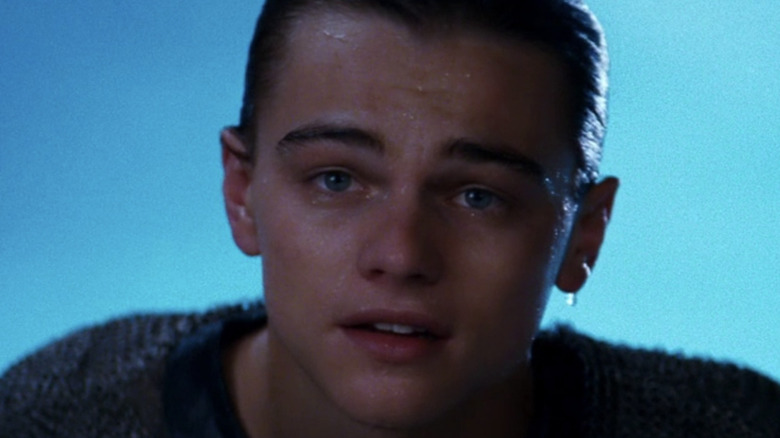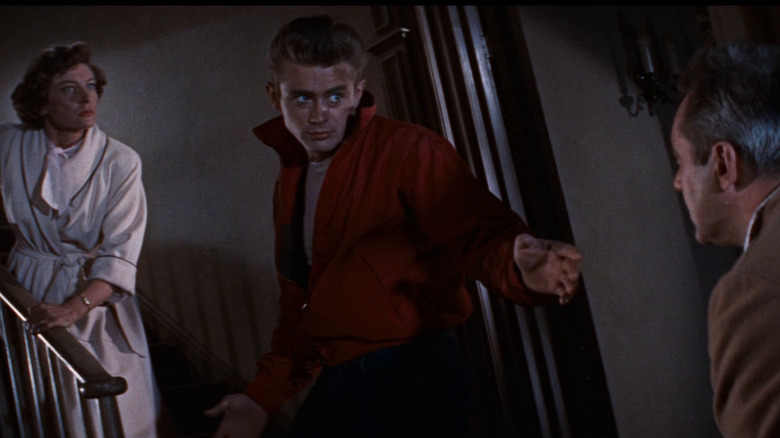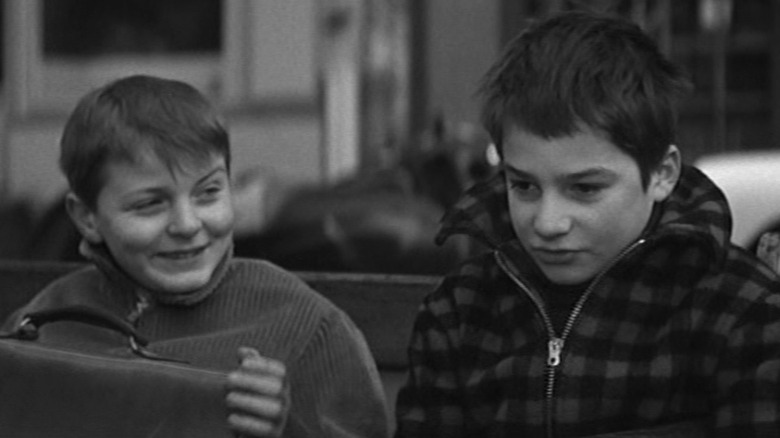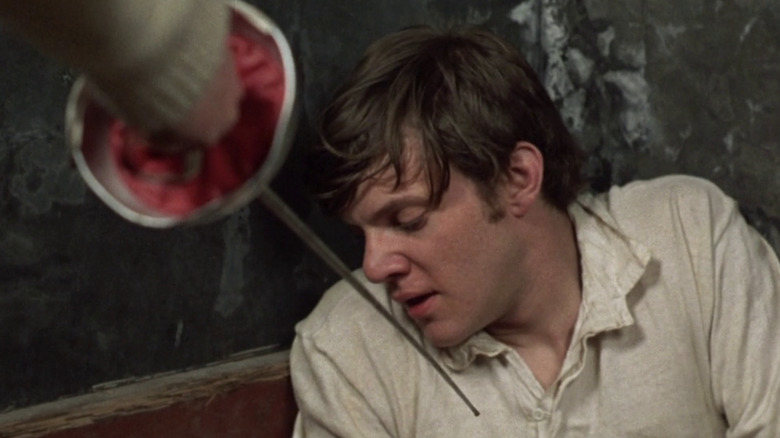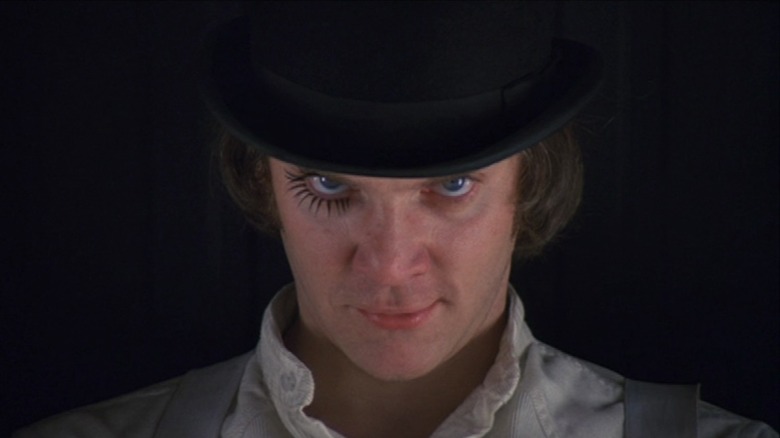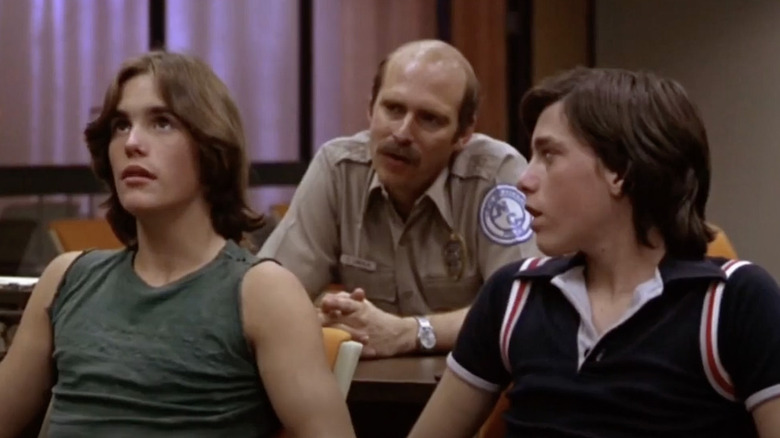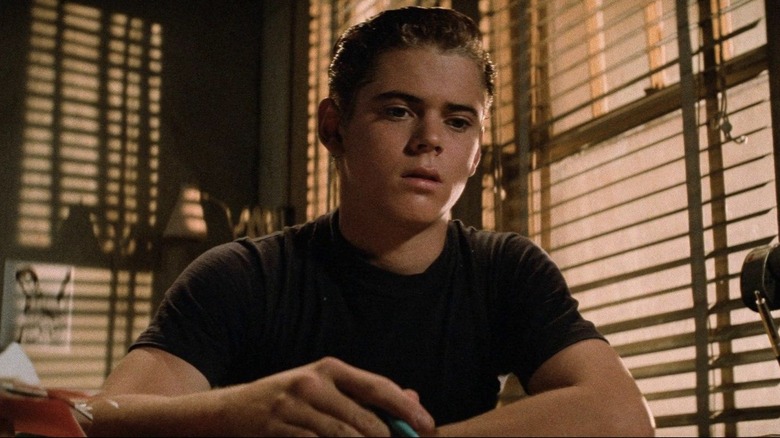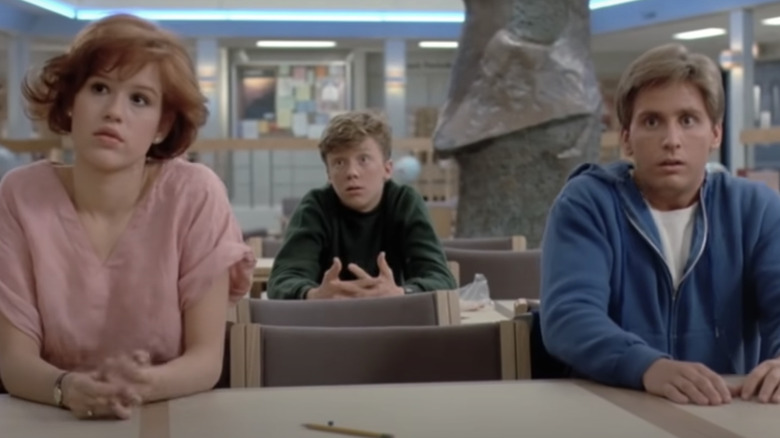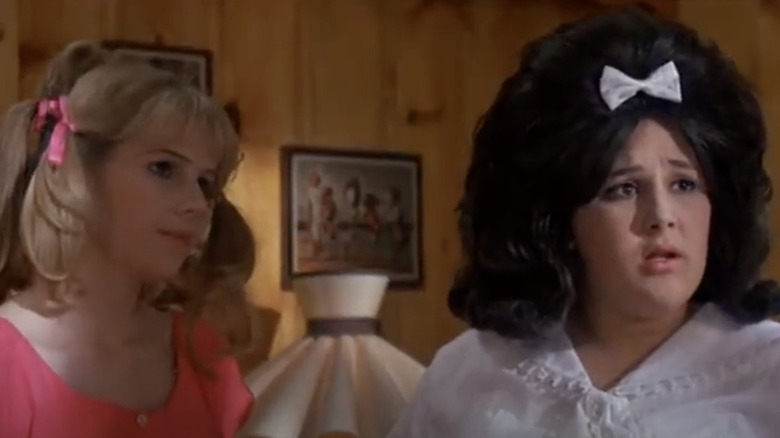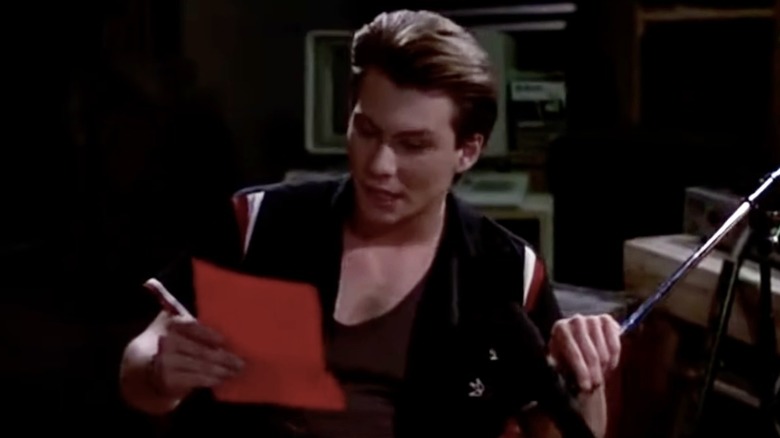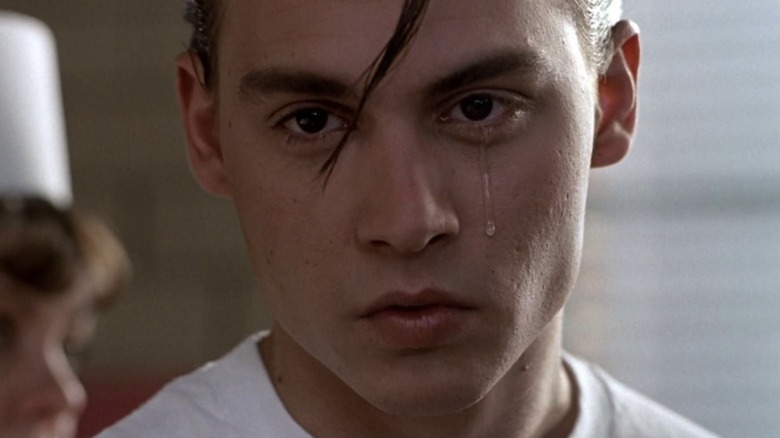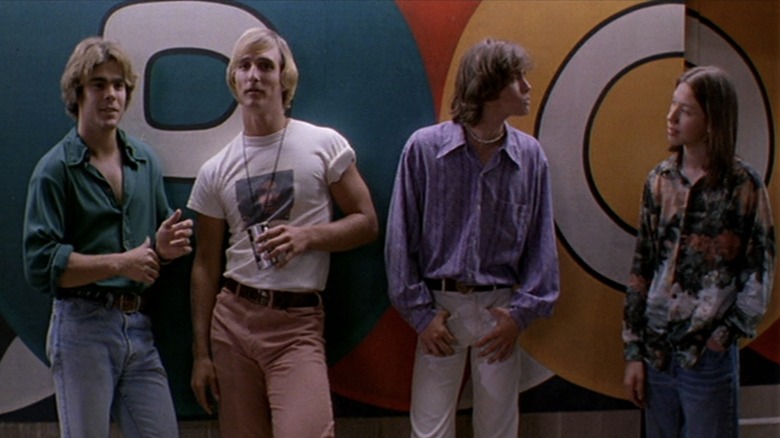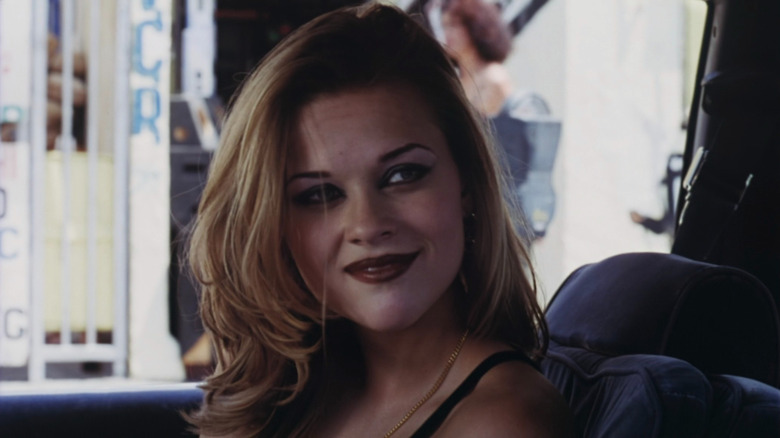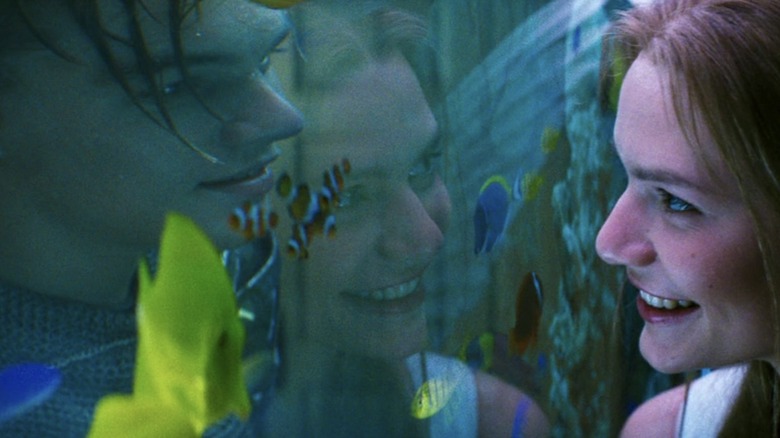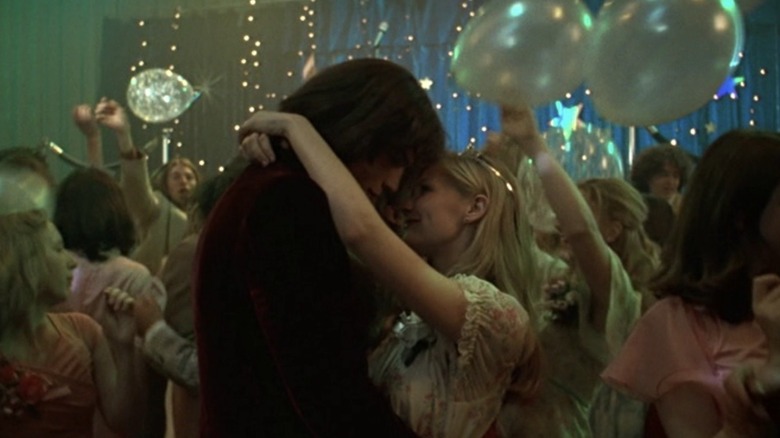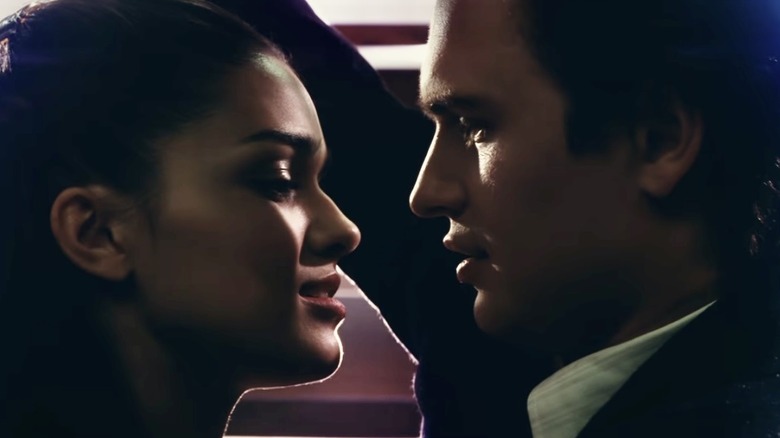Retro Teen Rebellion Movies That You Should Watch Next
For many people, challenging authority and the status quo is a necessary part of growing up. Teens push against the rules of their families, schools, and cultures, as they try to figure out who they are and how they fit into the world. It is a natural part of the individuation process, but this rebelliousness isn't always received well by parents, authority figures, or cultures that demand conformity. In fact, this type of teenage rebellion can sometimes lead to tragic consequences if these young people are perceived as dangerous or subversive for stepping outside the norms and mores of their society.
Teen rebellion has been a favorite cinematic trope for decades. The 1950s marked the first time that adolescents were acknowledged as a distinct demographic within society and with that, they became a group of people for films to market to (via Encyclopedia.com). Coming-of-age stories resonate with audiences of all ages, as older viewers can remember what it was like to be young, while others may see themselves more closely reflected on screen. Despite cultural shifts and technological advancements made over the years, the struggles, frustrations, and insecurities of being a teenager have changed little. Adolescence can be such an intense and visceral time that many of us can still remember the restlessness and angst experienced during those tumultuous teenage years, no matter how long ago they were. So, join us as we revisit the retro teen rebellion movies that you should watch next!
Rebel Without A Cause (1955)
"Rebel Without A Cause" — starring James Dean, Sal Mineo, and Natalie Wood — gave voice to and helped define youth culture in the 1950s and later (per The Boston Globe). In some ways, it set the standard for the genre of teen rebellion movies by shifting the perspective to teens themselves (rather than showing them through adult eyes) and expressing the alienation and confusion that many adolescents experience by having conformity foisted upon them.
The film was revolutionary in part because it didn't depict juvenile delinquency and teenage rebellion as a problem of poverty, but rather as something that could occur in middle-class and upper-middle-class families too (per SBIFF). This film showed the ways that inadequate parenting could lead to the emotional turmoil of teenagers.
Jim's (Dean) family doesn't hold him accountable for his actions because they are afraid of social fallout. His mother dominates his more submissive father, which reveals a lack of unity in a family structure that is "supposed" to adhere to more traditional gender norms. Judy's (Wood) father distances himself from his daughter: He shames her for her nascent sexuality, and strikes her when she tries to display affection, which leaves Judy feeling rejected. Plato's (Mineo) family essentially abandons him, leaving him with their housekeeper. These three teens rebel in different ways, but come together as a found family, offering each other the support they are lacking at home.
The enduring legacy of this movie cannot be separated from the tragic death of Dean in a car accident mere weeks before the film was released to adoring audiences. Nor can it be separated from the bizarre and devastating ways the other stars – Mineo and Wood — died decades later, all of which adds deeper elements of sadness to this story that captures youth generally and that of its actors. This film is a tragic melodrama that on the one hand, argues for conformity, as it functions as a warning of the dire consequences of subverting societal norms. However, "Rebel Without A Cause" also gives an authentic voice to the growing discontent of youth culture, and this duality makes the film still relevant today.
The 400 Blows (1959)
The French-language film "The 400 Blows" tells the story of a boy, Antoine Doinel (Jean-Pierre Léaud), who is constantly in trouble at school and home. His parents aren't supportive and appear to be apathetic and selfish. So, he runs away and begins a life of crime with a classmate: He steals a typewriter from his father's office, and is sent to a juvenile detention center as a result. This is a downtrodden, personal, and nihilistic depiction of how children can become homeless and then part of the criminal justice system.
Antoine doesn't seem like a bad kid. He blames his inability to focus for his poor grades, but he also gets no encouragement or help at home to find a way to change this. Antoine turns to the streets because no one who is supposed to care about him does. His teacher is awful and seems to hate children. He is the illegitimate child of an unwed mother and was raised by his grandmother, until he was sent to live in poverty with his stepfather and mother in Paris.
"The 400 Blows" is an early example of French New Wave Cinema and was inspired by writer/director François Truffaut's childhood (via Criterion). Truffaut and his mentor, film critic Andre Bazin, are the originators of auteur theory, which postulates that directors are the "authors" of a film. "The 400 Blows" marked Truffaut's directorial debut and is an early example of auteur filmmaking. It was also one of the first independent films made outside the studio system and was an influence on American auteur filmmakers like Francis Ford Coppola and Martin Scorsese (per MTV). Part of the power and longevity of "The 400 Blows" comes from the fact that this affecting story is told from Antoine's perspective. There is no moralizing, judgment, or dramatizing, which has given this realistic and heartbreaking film near-perfect scores on Rotten Tomatoes.
If.... (1968)
The 1968 British film "If...." was the big-screen debut of Malcom McDowell, who plays Mick Travis, a rebellious senior at an old-fashioned boarding school in the English countryside. This film is a satirical, darkly funny exploration of the anti-establishment, anti-war youth movement born in the United States, which spilled across the Atlantic Ocean and invaded the UK during the 1960s. Mick and his friends push against cultural norms, letting their hair grow shaggy and defying the strict rules of the power-hungry Whips or upper classmen prefects.
Director Lindsay Anderson used the structured microcosm of an English boys' school as a stand-in for the conservative U.K. This film is critical of the British government, using the senior Whips as stand-ins for law enforcement, while the teachers and the headmaster embodied the parliament and prime minister. "If...." has excellent scores on Rotten Tomatoes with both critics and audiences alike. Michael Buening writes for Pop Matters that in the decades since the film's initial controversial release, "The divisiveness with which the original audience seems to have reacted to Mick has faded."
"If...." moves between surreal and realistic scenes, making it impossible to know if the military attack Mick and his friends carry out on the school at the end of the film is a figment of Mick's imagination or actually happens. It's an eerily prophetic sequence for modern American audiences in particular, and makes this violent ending all the more disturbing, as we watch these boys' explosive rage and rebellion find an outlet.
A Clockwork Orange (1971)
Writer/director Stanley Kubrick's 1972 film adaptation of Anthony Burgess' dystopian novel "A Clockwork Orange" is thought-provoking, disturbing, and marked by an extreme gallows humor. Really, it's an assault on the senses, which has polarized audience reactions since the movie's release. The film was controversial due to its X-rating (the equivalent of an NC-17 rating today) in the U.S., and British audiences and media in particular blamed Kubrick for inciting violence with this graphic film. This scapegoating led to Kubrick himself pulling "A Clockwork Orange" from circulation in the U.K. in 1974, where it remained banned until his death in 1999 (per The Guardian).
The sexual violence depicted in the film is highly disturbing, as is Alex's (Malcolm McDowell) nonchalant attitude towards violence or "ultra-violence." But this film doesn't glamorize violence per se. Alex is arrested and sentenced to prison for his crimes, where he volunteers for an experimental behavior modification treatment to shorten his prison sentence. At this point, the film delves into the major themes of free will, morality, and societal control.
"A Clockwork Orange" interrogates how youth offenders are dealt with in both society and the criminal justice system, as it questions if the overarching goal is one of rehabilitation or punishment. In Alex's case, punishment is masked as rehabilitation to turn him into an "acceptable" member of society, so there's a certain poetry to the fact that a film about a gang of sadistic, violent teenagers on a rampage was received with violent vitriol. At the same time, this film about teen rebellion was also treated with disdain, much how rebellious teens are treated by society, which seems fitting as well.
Despite bursting into the pop culture zeitgeist in 1971, "A Clockwork Orange" is still vibrant, prescient, and influential, as seen in its high scores on Rotten Tomatoes, and for many, this controversial film is the pinnacle of the teen rebellion genre.
Over the Edge (1979)
Jonathan Kaplan's 1979 film "Over the Edge" is one of those cult classics that is obscure, yet culturally influential. The movie inspired several prominent Gen X voices, such as Richard Linklater and Kurt Cobain, who said this movie "pretty much defined my whole personality" (per Vice). This low-budget film had a limited release in New York and Los Angeles in 1979, but was pulled just a few days later because of concerns that it might incite rioting amongst disaffected youth.
A spurt of vandalism in the suburbs outside San Francisco in the early '70s inspired this film, which explores the dangers of teenage boredom and angst in the community of New Granada (per The NY Times). The cast is comprised of mostly unknown child actors, and includes a young Matt Dillon in his screen debut as Ritchie, the ne'er-do-well, who meets a tragic and untimely end.
Aspects of the film have aged poorly and the low budget is apparent, but it still effectively captures the raw energy of teen angst and restlessness. The young cast brings an authenticity to the film that's rarely seen in glossy teen nostalgia films. Despite not being widely distributed until its DVD release in 2005, "Over the Edge" has garnered solid scores with both audiences and critics on Rotten Tomatoes. If you want to see a movie about teen rebellion that was influential for filmmakers and cultural icons, you can now stream it as a digital rental!
The Outsiders (1983)
Although director Francis Ford Coppola's film adaptation of S.E. Hinton's novel "The Outsiders" was released in 1983, the movie effortlessly brings us back to a 1960s era Tulsa, Oklahoma. The period dress, cars, hairstyles, and musical score all root us in the past: a time when greasers and "Socs" (short for "socials") were at odds, and the side of town you were from determined your opportunities in life. It is a classic tale of haves and have-nots. Despite his look and style, Pony Boy Curtis (C. Thomas Howell) defies the greaser stereotype. He is sensitive and observant, loves to read novels and poetry, and often shares his insights with his best friend Johnny Cade (Ralph Macchio).
Tensions brew between the two gangs and culminate when Pony Boy gets into an altercation with a group of Socs, who try to drown him. Johnny kills one of the Socs to save Pony Boy, and the two friends go on the lam, hiding out in an abandoned church. The church catches fire while children are trapped inside, and the boys and their friends risk their lives to save these kids. Johnny and the other greasers, who have been branded juvenile delinquents, are now seen as heroes, showing that they're more than the stereotypes others believe them to be. The cast of "The Outsiders" became enormous stars, and the film is a classic coming-of-age story that has become a favorite for many since its release.
In an interview with Yahoo!, Coppola noted that he was nursing wounded pride and near-financial ruin after a box-office flop, when he received a letter from a group of students in Fresno, California. He explained, "These children had voted that I should take their favorite book and make it into a film ... And I read it, and I was very touched by the book because it showed how young people really have such strong feelings. I was very moved by it." Coppola credits these kids for his decision to make the film, as well as for its enduring relevance, as audiences have continued to find resonance in its tale of youth, friendship, and identity.
The Breakfast Club (1985)
Writer/director John Hughes' masterpiece "The Breakfast Club" was one of those rare films that was both enjoyed for its entertainment value and taken seriously when it was made. It's widely acknowledged as one of the best representations of the teen experience in the 1980s and one of the best teen films of all time. "The Breakfast Club" is still relevant today, boasting excellent scores on Rotten Tomatoes with critics and audiences alike, although the film's lack of diversity remains one of its few major flaws and justified criticisms.
The film's set-up of five high school students spending Saturday detention together in their school library is perfect in its simplicity. Each character represents a stereotype: the criminal, the jock, the popular princess, the nerd, and the basket case. But as the day progresses, these stereotypes are broken down, and we come to see the complexity and vulnerability of each character and the myriad of rebellions that have brought them together.
"The Breakfast Club" takes teenagers' thoughts and feelings about life seriously and doesn't belittle them. The film acknowledges their experiences and feelings as valid, and sometimes more poignant than those of adults, who have learned to numb themselves to life. When Allison Reynolds (Ally Sheedy) says, "When you grow up, your heart dies," it resonates with many viewers, who remember that adolescent fear of growing up to be sleepwalkers. "The Breakfast Club" adeptly deals with serious issues like child abuse and suicide with sensitivity and grace and ultimately, it strikes the perfect balance between humor and heart to leave you hopeful.
If you or anyone you know is having suicidal thoughts, please call the National Suicide Prevention Lifeline at 1-800-273-TALK (8255).
If you or someone you know may be the victim of child abuse, please contact the Childhelp National Child Abuse Hotline at 1-800-4-A-Child (1-800-422-4453) or contact their live chat services.
Hairspray (1988)
Writer/director John Waters' 1988 musical "Hairspray" is set in his hometown of Baltimore, Maryland in 1962. Waters' love of "The Buddy Deane Show" — a Baltimore-based dance show like "American Bandstand" — inspired this nostalgic film, which became his biggest hit (per The LA Times). "Hairspray" tells the story of Tracy Turnblad (Ricki Lake), a spunky teenage girl, who loves to dance but feels constrained by the conservative culture of Baltimore.
Despite being chubby and not conforming to the feminine "ideal" of the time, Tracy becomes a lead dancer on "The Corny Collins Show." Tracy uses the show as a platform to fight segregation and find love, but hits a snag when she is sent to reform school after being arrested while protesting. Waters' film strikes that perfect balance of being sweet and sharp, funny and thoughtful. In 2018, 30 years after the movie's release, Lake Told the LA Times, "Tracy became the poster child for anyone who felt like an outcast, who didn't fit in ... I love that her spirit and the character has lived on."
This film was clearly a product of love for Waters, and it evokes a sweet, optimistic, and nostalgic vibe. One of the beautiful things about being a filmmaker is you can rewrite history. As Waters told The LA Times, "In real life, 'The Buddy Deane Show' went off the air because they couldn't integrate ... I gave it the happy ending that did not happen." Audiences and critics alike have responded to Waters' happy ending and vision of teen rebellion, as the film has a nearly perfect critic score on Rotten Tomatoes.
Pump Up The Volume (1990)
"Pump Up the Volume" is about Mark (Christian Slater), an angsty and lonely teenager, who starts a pirate radio show out of boredom after his family moves from New York to Arizona. Mark has a desperate need to be seen and heard, but struggles with his debilitating shyness, which makes having conversations feel impossible. He finds solace in the anonymity of the radios, and this personal outlet soon transforms him into an incendiary voice of protest. He leads the charge against his high school's authoritarian and corrupt principal, who cares more about test scores than a kid's right to an education. Mark's pirate radio show becomes a rallying cry for change and naked honesty, and brings the student population of his high school together in protest, much to the dismay and frustration of both parents and staff.
"Pump Up the Volume" was released in 1990 to Gen-X teenagers, many of whom were wondering what bleak world they might meet in adulthood (via The Guardian). "Pump Up the Volume" is more political than your average movie about teenage rebellion, and that is precisely what makes it so good. The film addresses freedom of expression and individuality, as well as the cost of conformity and unrealistic expectations for teenagers.
The film also was an early call for the discourse we would one day find in podcasts, which offer similarly thought-provoking discussions free of gatekeepers and the FCC. "Pump Up the Volume" was way ahead of its time, and still feels prescient today. If the solid scores on Rotten Tomatoes aren't enough to sway you, maybe the promise of a top-notch soundtrack will.
Cry-Baby (1990)
While "Hairspray" was cotton candy sweet nostalgia, Waters' 1990 follow up, "Cry-Baby" was over-the-top campy fun. Johnny Depp stars as Cry-Baby, a drape from the wrong side of the tracks, who falls for a square named Allison Vernon-Williams (Amy Locane). Part juvenile delinquent, part sensitive artist in training, Cry-Baby is the embodiment of a popular contradiction: the bad boy with a heart of gold.
The film explores cinematic teen rebellion tropes and young love through a comedic lens. Set in early 1950s Baltimore, Waters once again takes us back to a time when conformity was required and individuality was perceived as a threat. In this film, we revisit many story elements we've seen in the foundational films about teen rebellion: "Rebel Without A Cause" is evoked in the chicken race and "Grease" is referenced when Allison gets her bad girl makeover. Additionally, Waters explores the role Elvis and rock and roll played in the development of youth culture during the '50s, and how this music was seen as subversive and dangerous by older generations.
While poking fun at the teen exploitation films of the '50s, "Cry-Baby" also celebrates them and walks that fine line between commentary and idolatry. While not as popular with critics or audiences on Rotten Tomatoes as Waters' earlier hit "Hairspray," this pop culture pastiche is still worth watching, even if only to appreciate Depp's chiseled cheekbones and perfect pout. If you are taking a cinematic walk down Teen Rebel Lane, "Cry-Baby" is essential viewing.
Dazed and Confused (1993)
Although writer/director Richard Linklater's low-budget film "Dazed and Confused" was a box-office bomb, it has since become a much-loved cult classic, and a favorite for those who saw it in theaters as teenagers during the summer of 1993. Somehow, this period throwback about a group of rowdy teenagers in a small Texas town on the last day of school in 1976 became a generation-defining film for '90s Gen-X teens (per Rolling Stone). However, the film appeals across generations, as seen in its universal acclaim among both audiences and critics on Rotten Tomatoes.
The cast was composed of then unknown actors, and while some — like Matthew McConaughey and Parker Posey — went on to become famous, others returned to their regular off-screen lives after making the film. For many viewers, "Dazed and Confused" strikes the perfect balance between nostalgia and authenticity, as it reminds us of the simple pleasures of a warm summer night and fun antics with our friends. Unlike most films about rebellious teens, this isn't a depressing story that's weighed down by the melodrama of tortured youth. It is a slow and buoyant ride, which offers a glance back at the simpler times and freedom of youth, when you have your whole life ahead of you.
Sure, the kids in the movie complain about their boring hometown and how they can't wait to get out. But really, it's a movie about friends (and frenemies) making memories together that they'll later look back on with a smile when a certain song comes on, which reminds them of that hot summer day in 1976. Watching "Dazed and Confused" can feel like catching up with an old friend, while listening to the soundtrack of your youth.
Freeway (1996)
Screenwriter Matthew Bright's directorial debut film "Freeway" is a modern retelling of the fairytale of Little Red Riding Hood as a dark comedy. Although the low-budget film wasn't a commercial success, it has become a cult classic thanks to its exploration of the life of 15-year-old Vanessa Lutz (Reese Witherspoon). Vanessa is a spunky, independent teenager, who's caught in the foster care and juvenile detention systems, and whose life takes a dark turn when she's arrested for shooting Bob Wolverton (Kiefer Sutherland) in the head.
Vanessa's mother is a drug-addicted sex worker, who gets arrested along with Vanessa's stepfather. Desperate to avoid being put back into foster care, Vanessa decides to run away to her grandmother's house in Stockton, California. While driving north, Vanessa's car breaks down, so she gets a ride from Bob, who gains her trust and then reveals that he is the serial killer stalking young women along the highways of Los Angeles county. Vanessa shoots Bob and escapes from him, only to be picked up by the authorities, who don't believe her due to her own criminal record and family history.
"Freeway" tackles Vanessa's story with cunning humor and surprising sensitivity. Vanessa isn't faultless, as she makes a lot of mistakes and is prone to violent outbursts. However, she is treated fairly by the film, which depicts her as a complicated young woman, who's just trying to survive the difficult and damaging circumstances of her life. The film is free of moralizing and judging, which makes it feel almost like a spiritual sibling to "The 400 Blows." In fact, even the last frame of "Freeway" — a frozen closeup of Vanessa smiling — mirrors the last frame of that seminal French film, and any fan of the independent or rebellious teen genre will be sure to enjoy this modern Little Red Riding Hood tale.
Romeo + Juliet (1996)
Perhaps one of the most classic forms of teenage rebellion is dating someone that your parents don't approve of, and the story of Juliet and her Romeo is the prime example of this trope. Director Baz Luhrmann's 1996 modern adaptation of William Shakespeare's "Romeo + Juliet" was a brash and inventive take on the famous play. While some critics — like Roger Ebert, who gave the film a 2-star review — hated Luhrmann's artistic vision. But over the years, the film has been embraced by audiences, securing favorable ratings on Metacritic and Rotten Tomatoes.
What makes this adaptation of Shakespeare's tragedy so brilliant is that the film itself is a rebellion against cinematic conventions and announced Luhrmann as a fresh voice in filmmaking. Shakespeare's play isn't treated as precious and static but rather, it is alive and evolving. The movie is a riotous explosion of color and energy. It is in your face, wild, exuberant, and frenetic. Like a rebellious teen, this adaptation brought Shakespeare alive and made it relatable for a younger generation of viewers, while offending older traditionalists at the same time.
On the 25th anniversary of the film, Yasmin Omar wrote for Harper's Bazaar that Luhrmann's "fizzing, sparking, pistol-toting adaptation blazed across our screens and blasted the dust off Shakespeare," and boy did it! The film landed at No. 1 at the box office, launched Leonardo DiCaprio and Claire Danes into stratospheric stardom, and was nominated for an Oscar for Art Direction. Much like the original play, Luhrmann's adaptation of "Romeo + Juliet" has proven to be an enduring love story, which distills the excitement, sensuality, and sweetness of first love, all while embracing the tragedy of Shakespeare's star-crossed lovers.
The Virgin Suicides (1999)
"The Virgin Suicides" was Sofia Coppola's feature-length directorial debut. Coppola's adaptation of Jeffrey Eugenides' novel of the same name was an elegiac missive on adolescent longing, nascent sexuality, and the tragic results of oppressive parenting and restrictive religion, all set against shifting youth culture. The project was made by the alchemy of these two emerging talents, as Eugenides would win a Pulitzer Prize for his next novel, and Coppola would win an Oscar for her next film. While Coppola has built a successful career as a director, for some, it was this first film that still stands out as her most poignant (per The Atlantic).
Set in the 1970s in Grosse Pointe, Michigan, "The Virgin Suicides" tells the story of the beautiful but tragic Lisbon sisters, who are five girls aged 13 to 17. The film is told from the perspective of the neighborhood boys, who were fascinated by these mysterious girls and haunted by their gruesome group suicide. Despite the dark subject, the film has a dreamy quality: It simmers with the languid heat of summertime nostalgia and is steeped in an aesthetic that's evocative of a sun-faded photograph or an ephemeral daydream slipping through your grasp.
The aesthetic is symbolic of the boys' inability to understand what led to the Lisbon sisters choosing death rather than biding their time and then escaping their restrictive parents into adulthood. Coppola spoke to Entertainment Weekly about the film after the Criterion DVD release, saying, "There wasn't much poetic filmmaking that spoke to me as a girl and a young woman ... I love Jeffrey's book and I felt like he really captured the mystery of that age." Thankfully, Coppola translated Eugenides' work to capture that mystery and essence of adult womanhood in her own way, which makes "The Virgin Suicides" essential viewing for any fan of the teen film genre.
If you or anyone you know is having suicidal thoughts, please call the National Suicide Prevention Lifeline at 1-800-273-TALK (8255).
West Side Story (2021)
"Romeo and Juliet's" timeless tale has been explored through numerous iterations, but when that tragic love story was reimagined as "West Side Story," a musical about gang warfare set in a crumbling Manhattan neighborhood slated for urban renewal, the story became uniquely American. This American translation of Shakespeare's classic connected the star-crossed love both to rebellious youth culture, as well as our shameful legacy of racism and resistance against integration.
Set in 1957 against the backdrop of racism and neighborhood rivalries, Maria and Tony meet at a dance, where they fall in love at first sight. Their obvious connection sparks tensions between Maria's older brother Bernardo's (David Alvarez) Puerto Rican street gang, The Sharks, and the white street gang, The Jets. Tony, a former member of The Jets, has just been released from reform school and is trying to stay out of trouble, but he is drawn back into the fray by his best friend, Riff (Mike Faist), which leads to a tragic ending for everyone involved.
"West Side Story" was first born as a Tony-winning Broadway play in 1957 and it was adapted to film in 1961, when it won 10 Oscars. In 2021, Steven Spielberg reincarnated the musical for a whole new generation of audiences, despite the waning popularity of musicals. While some wondered if modern audiences would receive Spielberg's version of a beloved classic like "West Side Story," the film proved to be a critical hit, as seen by its excellent scores on Rotten Tomatoes. Newcomer Ariana DeBose won a Best Supporting Actress Oscar and the film garnered an additional six nominations. After all, the story of Maria (Rachel Zegler) and Tony's (Ansel Elgort) forbidden love still grips the heart and elicits sighs.
